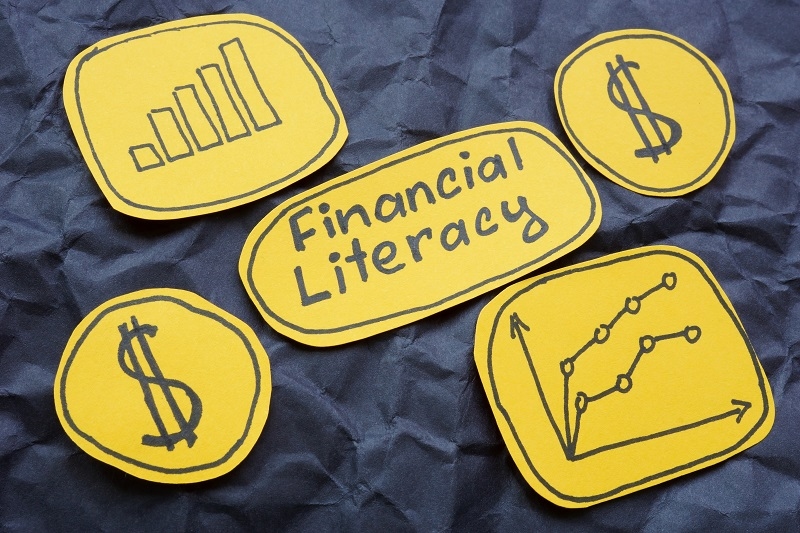Boost Money Skills with Financial Literacy Tips for Adults

Managing money can feel overwhelming, in particular in case you weren’t taught tons about budgeting growing up. But here’s the coolest information—growing sturdy cash behavior is a talent anyone can study at any level in life. With the right financial literacy tips for adults, you can enhance decision-making, reinforce economic safety, and create a course towards lasting wealth.
Whether you’re centered on knowledge of non-public finance, want cash schooling for beginners, or truly need realistic money control pointers to organize your daily life, financial literacy is the foundation of success. By mastering monetary basics and constructing clever money skills, you could take manipulate of your money as opposed to letting money control you.
This manual will come up with sensible techniques for budgeting, saving, making an investment, and coping with debt—the whole lot you need to feel assured and empowered while making economic choices.
Why Financial Literacy Tips for Adults Matter
A lack of economic literacy is considered one of the most important motives for human conflict with debt, overspending, and confined financial savings. Without economic literacy tips for adults, even those with proper incomes can find themselves dwelling paycheck to paycheck.
Here’s why economic literacy matters:
- It enables you to make knowledgeable selections about credit score, loans, and savings.
- It prevents steeply-priced mistakes whilst managing unexpected fees.
- It offers you equipment for lengthy-time period making plans like retirement or homeownership.
- It builds self-assurance, ensuring cash pressure doesn’t dominate your life.
The in advance you commit to studying financial fundamentals, the earlier you’ll create stability and freedom in your monetary adventure.
Understanding Personal Finance at Every Stage of Life
Understanding personal finance is one of the pillars of adult economic literacy. In this way, understanding how your financial future is shaped by your income, expenses, debt, savings, and investments taken together.
- Daily Life Budgeting: Having a budget helps you manage your finances. Tools facilitate a seamless start, much as the 50/30/20 rule: 50% requirements, 30% preferences, and 20% economic savings.
- Creating an Emergency Fund: Things happen, such as medical bills, activity modifications, and auto insurance. Small emergencies don't turn into financial catastrophes when you have three to six months' worth of living expenses saved.
- Effective Debt Management: While not all debt is harmful, having too much debt restricts one's financial options. Techniques like the avalanche or snowball approach to debt help you pay it off more quickly.
- Saving for Retirement Early: Even small contributions to a 401(good enough) or IRA can develop appreciably over the years way to compounding.
By mastering the one factor of expertise in private finance, you lay a sturdy foundation for financial safety.
Money Education for Beginners Made Simple
If you’re new to financial management, starting with money education for novices is essential. You don’t need to be a professional—you just need to understand the necessities.
- Track Your Spending: For one month, report each expense. This creates awareness of where your money is going.
- Learn About Credit Scores: Your credit rating impacts loan approvals, interest fees, and even condo agreements. Pay payments on time and keep your credit card balances low to improve your score.
- Understand Interest Rates: Knowing the difference between simple and compound interest helps you keep away from luxurious loans and maximize financial savings.
- Use Free Resources: Podcasts, online guides, and economic literacy apps are extremely good cash training for beginners equipment to build confidence.
By embracing gaining knowledge of monetary fundamentals, beginners gain self-assurance in managing each short-term period budget and long-term goals.
Acquiring the Fundamentals of Finance for Daily Achievement
Even seasoned people benefit from reviewing and learning financial basics. The intermediate actions listed below allow you to maintain equilibrium and stability:
- First, pay yourself: Prior to spending money on luxuries, automate financial savings.
- Distinguish between needs and wants: One of the most important lessons in frugal spending is to distinguish between needs and wants.
- Establish Positive Credit Habits: Keep utilization below 30% to prevent invoices from going unnoticed.
- Safeguard Your Funds: Being financially responsible includes things like fraud protection, wills, and insurance.
Regardless of your financial level, you're usually on firm ground if you can master the essentials.
Developing Smart Money Skills for Long-Term Growth
The subsequent segment is to broaden clever money capabilities, which go beyond the fundamentals. These are procedures that allow your money to grow and increase for you.
- Learn to Invest: Not only do the wealthy make money through investing. Over time, even modest sums invested frequently in index funds or alternate-traded price range (ETFs) can grow.
- Spread Out Your Revenue: More financial safety may be obtained via facet projects, freelance art, or passive income resources.
- Master Negotiation: Your long-term wealth may be considerably impacted through negotiating rent, payments, or salaries.
- Avoid Lifestyle Inflation: As income grows, many human beings spend more rather than opposed to save more.
- Keeping a way of life inflation: In testing is one of the smartest cash management hints.
With consistent exercise, those clever money skills emerge as behavior that accelerates wealth constructing.

Practical Money Management Tips You Can Use Today
To completely embrace monetary literacy recommendations for adults, you need day by day exercises and practice. These coins manage tips, making financial situations 2nd nature:
- Use Budgeting Apps: Tools like Mint or YNAB simplify tracking prices.
- Set Financial Goals: Whether quick-time period (excursion fund) or long-term (retirement), goals keep you encouraged.
- Automate Bills: Avoid late charges with the ability to put in an area computerized bills.
- Review Subscriptions: Cancel unused or pointless services to unfasten up cash.
Applying the one cash manipulation pointers ensures you stay prepared and continually develop along the route of your desires.
Developing Financial Literacy to Build Wealth
The production of wealth is where the real power of grown-up economic literacy lies. Saving money is critical; however, building real assets is what gives long-term financial security.
- Invest Early and Frequently: Even small monthly donations can have a great effect.
- Recognize Your Risk Tolerance: Align your investment approach with your degree of comfort.
- Benefits of Employers: Benefit from stock alternatives or retirement contributions.
- Reinvest Profits: Compounding growth can be fueled through dividends and interest.
Building wealth requires patience, but when mixed with astute monetary abilities, it will become a possible intention.
Overcoming Common Money Mistakes
Even with the pleasant intentions, errors manifest. Being aware of them is a part of cash education for novices and vital for development.
- Living Without a Budget: This is the fastest way to overspend.
- Relying on Credit Cards for Emergencies: Instead, build an emergency fund.
- Not Reviewing Financial Progress: Without tracking, goals stay distant.
- Ignoring Retirement Savings: Delaying contributions expenses hundreds through the years.
Avoiding these mistakes at the same time as embracing studying economic basics enables you to live heading in the right direction.
Financial Education for Generations and Families
The ability to transfer information ahead is one of the most beneficial results of adult financial literacy tips. Educating children or younger family members guarantees that future generations are better off financially.
- Teach Kids About Savings and Allowances: Today's small classrooms help children develop good behavior for the rest of their lives.
- Set an Example of Responsible Spending: Kids often imitate the actions of adults.
- Have frank discussions regarding money: Dispel the taboo around talking about money.
- Make a plan together: Take classes on purpose-setting or budgeting with your own family.
Strong financial instruction helps entire families and groups, not just individuals.
Final Thoughts on Financial Literacy Tips for Adults
Money doesn’t need to be complicated or demanding. With the right information, you can avoid costly errors, make better decisions, and design a financially independent future. The enjoyable aspect? Little, simple steps are the first.
Practice smart money skills to build your wealth, share your knowledge with others, and use those adult financial literacy recommendations to fortify your foundation. Financial literacy isn't always pretty much managing money—it’s approximately taking control of your life.
This content was created by AI

